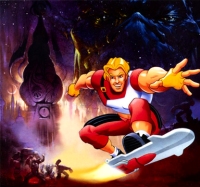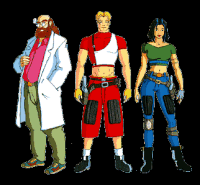
Space-travelling hero Flash Gordon got an all-new series with this 1996 syndicated series from
Hearst Entertainment. Garfield and Judith Reeves-Stevens, a married pair of science fiction writers,
were hired for the Canada-France co-production to create the show. They were given the responsibility
of making the new Flash Gordon show appealing to "today's kids". They started by making Flash younger
and more "hip". In previous incarnations, Flash had been a polo player, a football player, and a
basketball player. This time out, Flash is portrayed as a cocky young skateboarder. (Groan.) This may
have made him more appealing to kids, but I found my suspension of disbelief being tested by the
notion of a smarmy skateboarding teen saving the universe from an evil conqueror.
They did try to at least give Flash a background that suggested he would be up to taking on Ming the
Merciless. After all, Flash is a video game addict and son of two space shuttle astronauts, so
naturally he would be able to fly spaceships on Mongo, right? Uh-huh. Well, it is a little much to
swallow, but then the original comic strip was known for some pretty far-out fantasy too.
Like previous versions, Flash is teamed up with the lovely Dale Arden (also a teen) and scientist Hans
Zarkov (balding, bespectacled, and definitely not a teen). Flash's parents were American astronauts
who got sucked into a dimensional hole just outside the earth's atmosphere. The trans-dimensional
portal was placed there by Ming the Merciless, emperor of the planet Mongo, who hoped to provide open
access for his invading armies.

Flash, Dale, and Zarkov followed Flash's parents in their own space vehicle, rescuing them and closing
the dimensional hole. Unfortunately, Flash and crew were stuck on the Mongo side. The earthlings
discovered other nearby planets with anti-Ming factions and put together a loose coalition, determined
to overthrow Mongo's evil emperor and return Flash, Dale, and Zarkov to their native planet.
A multinational co-production, Flash Gordon came into weekly syndication in the fall of 1996. While
It may have been "hip and action-packed," the revamped Flash didn't have the staying power of his
earlier incarnations, bowing out after only 26 episodes. It also generated a season of toys as well.










